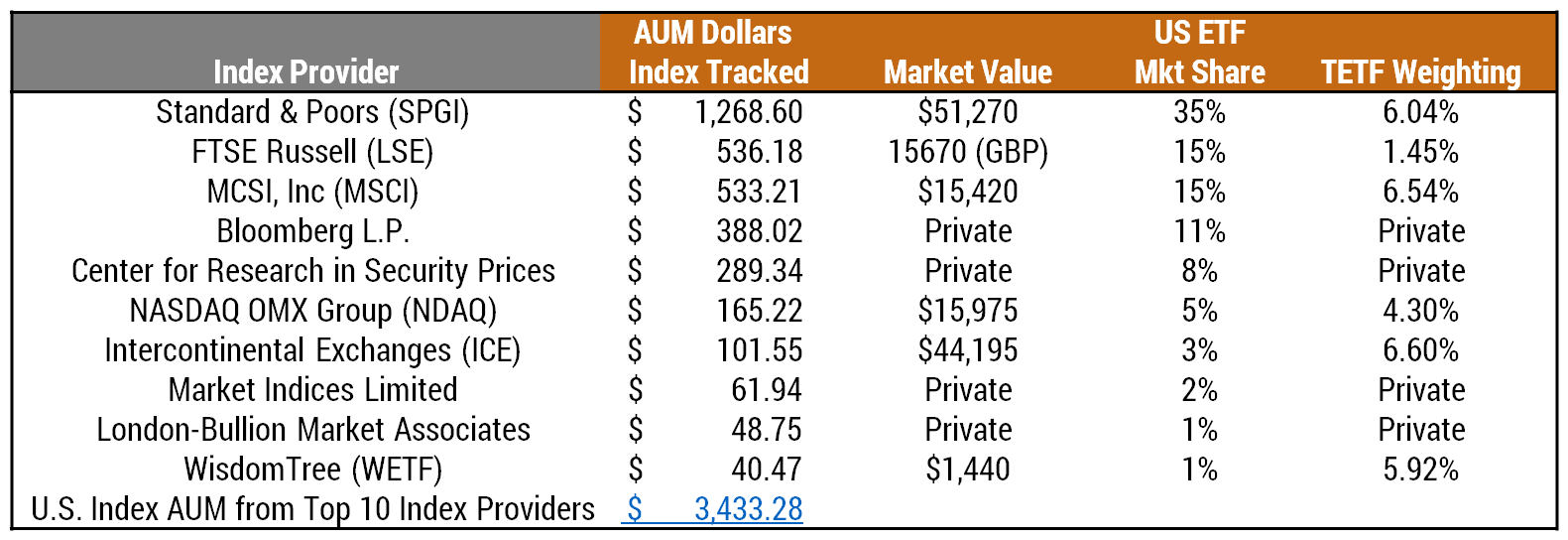Following up on our piece about, “The ETF industry is not just about sponsors” we thought we would drill down and highlight a peculiar set of coincidences about the index battle between MSCI and FTSE.
Truth be told, the success of the ETF industry is about investors looking for access to markets and solutions, liquidity, innovation and arguably all of this is driven by data and the index providers. Many may know that MSCI is public, but some may not know that FTSE Russell is owned by the London Stock Exchange (LSE) which is a 1.4% weighting in the index. MSCI is a 6.5% weighting in the TETFIndex.
Normally we wouldn’t get so in the weeds of specific positions in this report, but that these two rivals firms are only $3 billion apart in terms of assets makes this competition unusually interesting as a drama. According to our data, U.S. ETF index assets across these two firms are at $536 Billion at the London Stock Exchange (LSE) vs $533 Billion at MSCI (MSCI). We are not in the business of picking horse races, but as the chart below highlights there is a lot at stake here. In addition, while there are a lot of moving parts including currency and differences between the two businesses it is fun to note that the market capitalizations are similar with MSCI Inc at $15,420 Billion (MSCI – $171.57) and the London Stock Exchange Group at 15,631 (GBP) (LSE – 4,492).
The set up as a question is also very timely.
- On August 1, David Schwimmer, a long time veteran from Goldman Sachs begins his CEO role at the London Stock Exchange (LSE)
- On August 2, both companies will report and host earnings calls and the outcome from the results will almost certainly affect their market cap race. To be fair, MSCI is up 35% this year and LSE is up 18% so there is a lot of optimism for the U.S. contender.
![]()
 Last week MSCI’s stock hit an all time high of $176.88, but ETF historians may recall that on October 2, 2012 MSCI stock was rocked down 30% to about $10 a share because of Vanguard’s decision to change to the FTSE index. Beyond the temporary loss of market cap, arguably this was also an important date because it was the start of the price war. While we don’t pass judgement on this move, we do like to see the U.S. underdog win. We also have to admit that the decision by the 217 Year Old London Stock Exchange to buy the U.S. Russell Index in July 2014 for $2.7 Billion is a motivating factor for our opinion. We are rooting for MSCI in this race, but our hopes are irrelevant. Smart investor vote with their pocket books not with their emotions.
Last week MSCI’s stock hit an all time high of $176.88, but ETF historians may recall that on October 2, 2012 MSCI stock was rocked down 30% to about $10 a share because of Vanguard’s decision to change to the FTSE index. Beyond the temporary loss of market cap, arguably this was also an important date because it was the start of the price war. While we don’t pass judgement on this move, we do like to see the U.S. underdog win. We also have to admit that the decision by the 217 Year Old London Stock Exchange to buy the U.S. Russell Index in July 2014 for $2.7 Billion is a motivating factor for our opinion. We are rooting for MSCI in this race, but our hopes are irrelevant. Smart investor vote with their pocket books not with their emotions.

